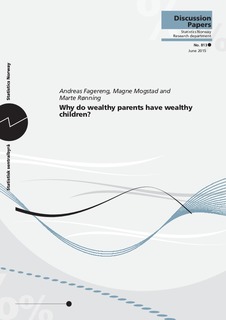| dc.contributor.author | Fagereng, Andreas | |
| dc.contributor.author | Mogstad, Magne | |
| dc.contributor.author | Rønning, Marte | |
| dc.coverage.spatial | Norway | nb_NO |
| dc.date.accessioned | 2019-07-29T11:45:42Z | |
| dc.date.available | 2019-07-29T11:45:42Z | |
| dc.date.issued | 2015-06 | |
| dc.identifier.issn | 1892-753X | |
| dc.identifier.uri | http://hdl.handle.net/11250/2606627 | |
| dc.description | This project received financial support from the Norwegian Research Council. | nb_NO |
| dc.description.abstract | Strong intergenerational correlations in wealth have fueled a long-standing debate over why children of wealthy parents tend to be well off themselves. We investigate the role of family background in determining children's wealth accumulation and investor behavior as adults. Our research design allows us to credibly control for genetic differences in abilities and preferences and to identify the effects of exogenous changes in specific dimensions of family background. The analysis is made possible by linking Korean-born children who were adopted at infancy by Norwegian parents to a population panel data set with detailed information on disaggregated wealth portfolios and socioeconomic characteristics. The mechanism by which these Korean-Norwegian adoptees were assigned to adoptive families is known and effectively random. We use the quasi-random assignment to estimate the causal effects from an adoptee being raised in one type of family versus another. Our findings show that family background matters significantly for children's accumulation of wealth and investor behavior as adults, even when removing the genetic connection between children and the parents raising them. In particular, adoptees raised by wealthy parents are more likely to be well off themselves, whereas adoptees' stock market participation and portfolio risk are increasing in the financial risk taking of their adoptive parents. These intergenerational causal links are not driven primarily by inter vivos transfers or bequests. The detailed nature of our data allows us to explore other mechanisms, assess the generalizability of the lessons from adoptees, and compare our findings to results from behavioral genetics decompositions. | nb_NO |
| dc.language.iso | eng | nb_NO |
| dc.publisher | Statistisk sentralbyrå | nb_NO |
| dc.relation.ispartofseries | Discussion papers;813 | |
| dc.subject | Intergenerational transmission | nb_NO |
| dc.subject | Wealth | nb_NO |
| dc.subject | Rikdom | nb_NO |
| dc.subject | Financial risk taking | nb_NO |
| dc.subject | Family background | nb_NO |
| dc.title | Why do wealthy parents have wealthy children? | nb_NO |
| dc.type | Working paper | nb_NO |
| dc.description.version | publishedVersion | nb_NO |
| dc.source.pagenumber | 49 s. | nb_NO |
